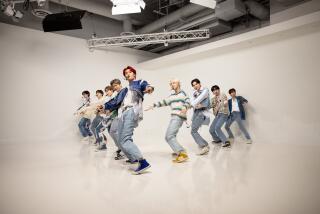‘Idol’ is intense up close
- Share via
TO the extent that a phenomenon as rich and complex as “American Idol” can be boiled down to a metaphor, the show’s appeal can be compared only to gladiatorial combat. Each week, every contestant’s life boils down to 90 seconds in which -- alone on a hostile stage -- he or she either soars or implodes. Then at the conclusion of each song, fate is handed to each one.
Watching on television, those moments can seem unbelievably strained and painful. Watching them live in the “Idol” studio, I discovered, the tension is much, much worse.
On Tuesday night, I was honored to bear witness in the Idoldome at CBS’ Television City studios -- to sit before the stage where Clarkson and Aiken, Daughtry and Underwood had begun their public lives. And my major impression was of what a cold place that stage was for these contestants, so small and so vulnerable in the flesh.
Although the Big Stage is actually not that huge (as is always the case, it’s smaller than it appears on television; the audience area, seating about 300, seems about as large as a medium-ish junior high auditorium), it is full and busy. Giant rotating neon columns flank the stage, a video screen circled by Martian antennas looms, spotlights everywhere, fog machines, a 20-some-piece band blaring 5 feet away -- three judges gazing on, blank and pitiless as the sun (and chatting through a shocking amount of the performances).
Standing alone on this stage, those contestants who “don’t have it,” as Simon Cowell put it, are swallowed whole by the apparatus. While the band gets the crowd on its feet and dancing, middling vocals drown underneath the giant effect, as was the case in Brandon Rogers’ and Chris Sligh’s performances.
The camera also plays capricious games, handing out its favors indiscriminately. Haley Scarnato’s and Phil Stacey’s performances seemed much weaker on TV than they had been in person; Blake Lewis and Chris Richardson seemed stronger.
On television, watching the inadequate contestants ripped to shreds provides the satisfaction of meritocratic justice unflinchingly administered. In person, the pain these young people endure is truly visceral -- from a hundred feet away, one could feel Sligh and Lewis go cold, and it was much harder not to pity them. Scarnato’s breakdown over flubbed lyrics was so intense it was a bit embarrassing.
On the other hand, one could sense Sanjaya Malakar’s indifference to the judges’ opinions as he shifted on his feet, like a schoolboy enduring a teacher’s lecture.
In the risers, debate on the great topics of our day raged -- Melinda vs. LaKisha, and which, if any, of the boys could break out of the pack.
My personal focus group, the extremely wise Kiki Hertel, age 9 from Fort Worth, arrived for the show bearing two signs -- for Melinda Doolittle and Gina Glocksen. She confided that Lewis is a major favorite in her class, an opinion shared by several others preteens in the risers. By the end of the night, however, it seemed Glocksen had not done much to help her darkhorse standing with Kiki. LaKisha had entered her top tier. “She has a really powerful voice,” Kiki confided.
The season has begun in earnest now. From here on in, history rides on every step.
Show Tracker follows television series through their highs and lows.
More to Read
The complete guide to home viewing
Get Screen Gab for everything about the TV shows and streaming movies everyone’s talking about.
You may occasionally receive promotional content from the Los Angeles Times.






